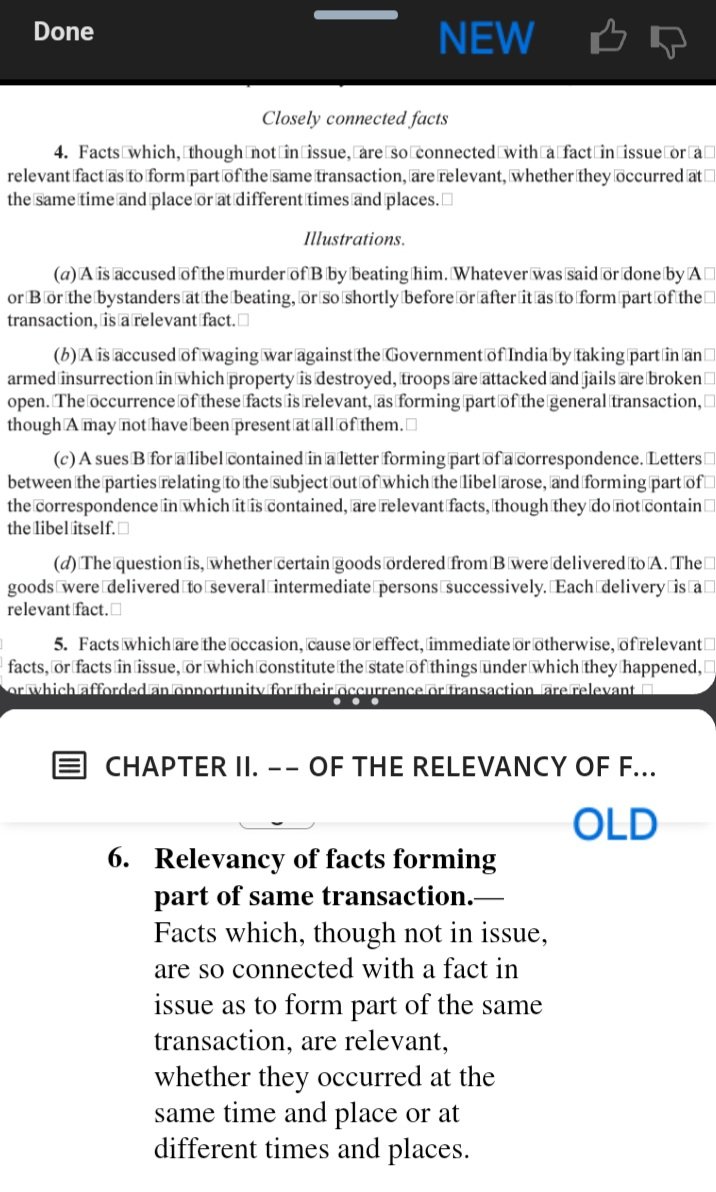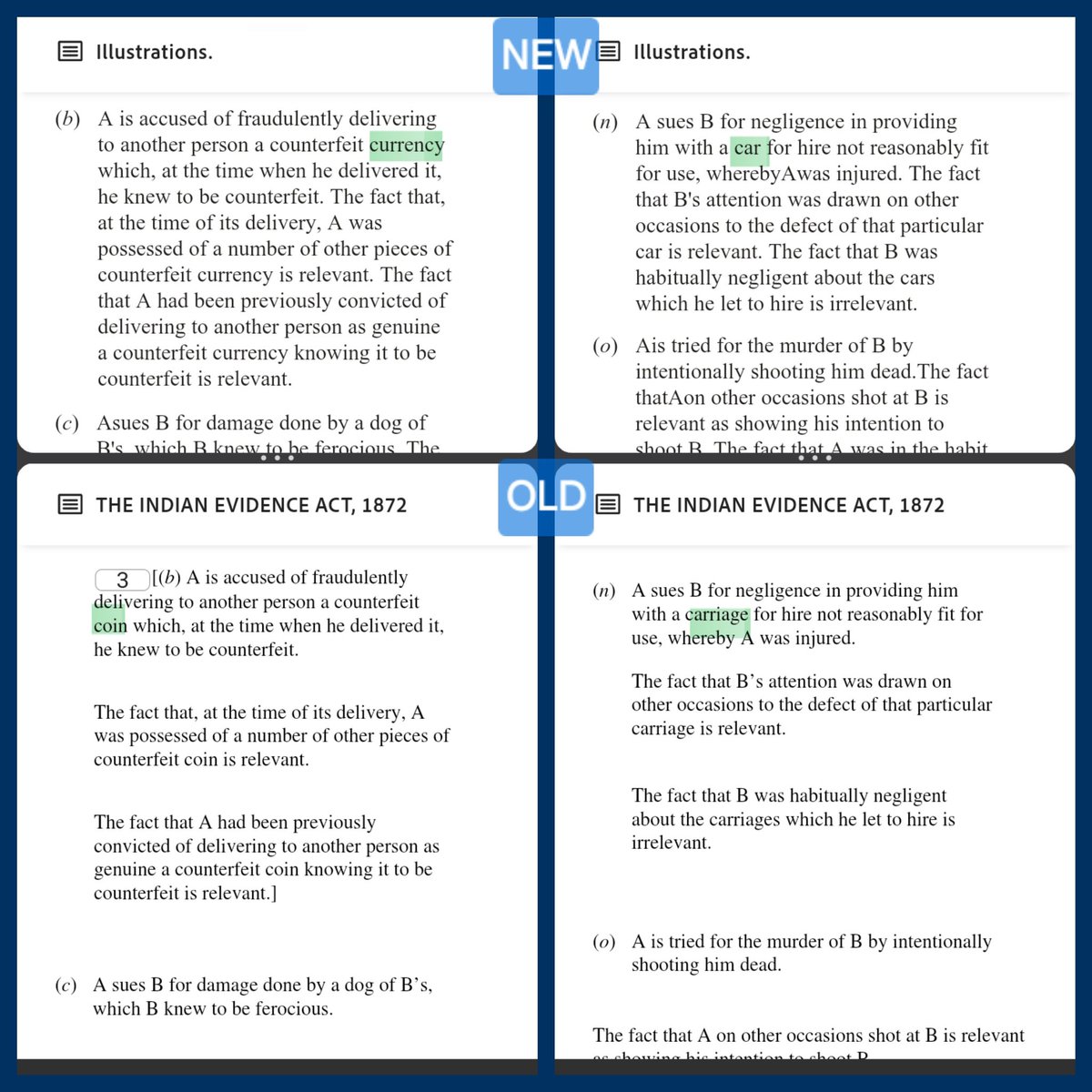Notes on the new Indian evidence statute:
Extent: Section 1(2) does not explicitly say that it applies to the whole of India. (Presumably, that's a given?) Also, unlike the old law, it appears to apply to all courts martial without any exclusions.
Other than that, no change.
Extent: Section 1(2) does not explicitly say that it applies to the whole of India. (Presumably, that's a given?) Also, unlike the old law, it appears to apply to all courts martial without any exclusions.
Other than that, no change.

(These notes are based on a quick comparison of the two statutes using documents available online. They may not be accurate, and should not be relied on for any purpose. They're merely an attempt to get a sense of what the new evidence law says in comparison to the old one.)
The definition of 'court' in the two laws is identical, as is that of 'fact' although section numbers differ.
Also, illustrating what constitutes facts, the old law stated: "That a man has a certain reputation, is a fact." The new law does not do so. Other eg remain unchanged.
Also, illustrating what constitutes facts, the old law stated: "That a man has a certain reputation, is a fact." The new law does not do so. Other eg remain unchanged.
The new law updates language in places without changing substance.
eg 'relevant fact'
The new law uses phrasing that is less archaic than the old law but, for all practical purposes, the law remains unchanged.
eg 'relevant fact'
The new law uses phrasing that is less archaic than the old law but, for all practical purposes, the law remains unchanged.

The definition of facts in issue (in a suit) remains unchanged.
The new law lists definitions in alphabetical order unlike the old law which relied on thematic listing. It makes more sense, one could argue, but could also feel unfamiliar & confusing if one's used to the old law.
The new law lists definitions in alphabetical order unlike the old law which relied on thematic listing. It makes more sense, one could argue, but could also feel unfamiliar & confusing if one's used to the old law.
lol. The definition of 'document' has been updated in the new law to mean matters expressed, described OR OTHERWISE RECORDED by means of letters, figures, marks OR ANY OTHER MEANS, etc — clearly future-proofing the definition in anticipation of unknown technological advancements. 

(Reminded of a lawyer once saying, "We're lawyers, not astrologers," exasperation writ all over his face when someone tried to insist on his giving an opinion about how various events would unfold.)
Good to see that the new 'document' definition won't need continual amendment.
Good to see that the new 'document' definition won't need continual amendment.
Oral evidence includes witness statements made electronically, the new law states, without change to the circumstances in which the old law envisaged oral evidence being given.
It also differentiates between electronic and digital records. (I'm unsure of implications of this.)
It also differentiates between electronic and digital records. (I'm unsure of implications of this.)

(Somewhat annoyingly, whoever reworked the definition of 'evidence' appears to have limited familiarity with semicolons, punctuation marks which were in the definition in the old law, and which were perfectly placed there. The new law has dumped the semicolons in the definition.)
Proved, Disproved, Not Proved:
All three definitions remain essentially unchanged by the new law apart from a minor (&, IMO, unnecessary) change of syntax in the definition of Disproved.
The three were placed together in the old law, no longer the with new law's listing. Sigh
All three definitions remain essentially unchanged by the new law apart from a minor (&, IMO, unnecessary) change of syntax in the definition of Disproved.
The three were placed together in the old law, no longer the with new law's listing. Sigh
May presume, Shall presume, Conclusive proof:
All three defs remain substantially unchanged in the new law apart from changes inconsequential to their substantive import (eg 'Act' in the old law changes to 'Adhiniyam' in the new law).
They're scattered around in the new law.
All three defs remain substantially unchanged in the new law apart from changes inconsequential to their substantive import (eg 'Act' in the old law changes to 'Adhiniyam' in the new law).
They're scattered around in the new law.

Finally, the new law ends its definitions by drawing definitions from other statutes into its own text.
Fair play, I guess. One can only hope this doesn't lead to confusion. (It's far beyond the scope of this thread to assess the implications of this section.)
Fair play, I guess. One can only hope this doesn't lead to confusion. (It's far beyond the scope of this thread to assess the implications of this section.)

The documents on which these notes are based are available here:
Once again, the notes should not be relied upon.indiacode.nic.in/bitstream/1234…
mha.gov.in/sites/default/…
Once again, the notes should not be relied upon.indiacode.nic.in/bitstream/1234…
mha.gov.in/sites/default/…
On to Chapter 2:
Of the Relevancy of Facts (per the old law) or as the new law simply says: The Relevancy of Facts.
It begins:
Evidence may be given of facts in issue and relevant facts.
All well and good and identical to the old law (down to the CPC ref!). Drafting error?
Of the Relevancy of Facts (per the old law) or as the new law simply says: The Relevancy of Facts.
It begins:
Evidence may be given of facts in issue and relevant facts.
All well and good and identical to the old law (down to the CPC ref!). Drafting error?

Facts forming part of the same transaction continue to be relevant.
The sec dealing with them in the old law has been subsumed into a broader one re Closely Connected Facts that makes relevant those facts connected to both facts in issue & relevant facts in the same transaction.
The sec dealing with them in the old law has been subsumed into a broader one re Closely Connected Facts that makes relevant those facts connected to both facts in issue & relevant facts in the same transaction.

Under the old law, facts in the same transaction were considered to be relevant only if they were connected to facts in issue.
The appended illustrations in the new law are the same as those in the old law & do not reflect its broadened scope (although 'gaol' is now 'jail').
The appended illustrations in the new law are the same as those in the old law & do not reflect its broadened scope (although 'gaol' is now 'jail').
(At the risk of sounding like a broken record, the notes here should not be relied upon. They're definitely not legal advice. And they do sacrifice nuance for brevity.
Try 'facts which could be considered to fall within the scope of the same transaction, not 'facts in it', eg.)
Try 'facts which could be considered to fall within the scope of the same transaction, not 'facts in it', eg.)
Facts which are the occasion, cause or effect of relevant facts or facts in issue etc continue to be relevant in the new law in terms identical to the old law. So too are facts which show or constitute motive or preparation.
Illustrations contain inconsequential differences.
Illustrations contain inconsequential differences.
For example, 'Act' becomes 'Adhiniyam' in the new law, 'vakils' becomes 'advocates', & 'ravished' becomes 'raped'.
Linguistic updates like these seem to be scattered throughout the new law. They do not seem to affect the import of the law (&, reading on, I plan to ignore them).
Linguistic updates like these seem to be scattered throughout the new law. They do not seem to affect the import of the law (&, reading on, I plan to ignore them).
Facts necessary to explain or introduce relevant facts are relevant.
The two provisions, one in the old law and the other in the new are the same. Except that the new law tries to correct the old law &, in doing so, misplaces a comma, wrongly turns 'any thing' into 'anything'.
The two provisions, one in the old law and the other in the new are the same. Except that the new law tries to correct the old law &, in doing so, misplaces a comma, wrongly turns 'any thing' into 'anything'.
Things said or done by conspirator in reference to common design.
The main provision remains unchanged in the new law, and the illustration of a convoluted conspiracy changes names of places: Bombay to Mumbai, eg, understandably &, less understandably, Kabul to Singapore!
>
The main provision remains unchanged in the new law, and the illustration of a convoluted conspiracy changes names of places: Bombay to Mumbai, eg, understandably &, less understandably, Kabul to Singapore!
>
> Though the provision re conspiracy remains unchanged (§8, new law) the appended illustration may change its tone — the eg no longer speaks of waging war against the Government of India as the old law did but of waging war against the State, presumably broadening its scope. 

When facts not otherwise relevant become relevant.
The provision remains unchanged in the new law. Someone has had fun with the names of places in the appended definition though. This time, Calcutta becomes Chennai, and Lahore becomes Ladakh! 🙂 (§9, new law)
The provision remains unchanged in the new law. Someone has had fun with the names of places in the appended definition though. This time, Calcutta becomes Chennai, and Lahore becomes Ladakh! 🙂 (§9, new law)

"In suits in which damages are claimed, any fact which will enable the Court to determine the amount of damages which ought to be awarded, is relevant." In the new law (§10) as in the old law (§12).
So too re facts relevant when right / custom is in question — no change in text.
So too re facts relevant when right / custom is in question — no change in text.
Facts showing existence of state of mind, or of body of bodily feeling—
The relevant section in the new law (§12) is identical to the one in the old law (§14). However, the illustrations have been updated. 'Coin' becomes 'currency' and 'carriage' becomes 'car'.
The relevant section in the new law (§12) is identical to the one in the old law (§14). However, the illustrations have been updated. 'Coin' becomes 'currency' and 'carriage' becomes 'car'.

Facts bearing on question whether act was accidental or intentional––
No change to the text of the provision but illustrations have been updated here too. 'Insurance office' becomes 'insurance company' and the delivery of a 'counterfeit rupee' becomes the delivery of currency.
No change to the text of the provision but illustrations have been updated here too. 'Insurance office' becomes 'insurance company' and the delivery of a 'counterfeit rupee' becomes the delivery of currency.
(It is hard to imagine a time when a single rupee was valuable enough to merit such attention.)
Anyway!
Existence of course of business when relevant—
No change other than that the Dead Letter Office is now the Return Letter Office in the illustrations.


Anyway!
Existence of course of business when relevant—
No change other than that the Dead Letter Office is now the Return Letter Office in the illustrations.


That completes a quick comparative read up to Chapter 2 of the Indian evidence statutes, new and old.
Will try to make my way through the rest of the text soon.
It looks like large parts of the old law remain unchanged, some parts have been updated, and a few parts broadened.
Will try to make my way through the rest of the text soon.
It looks like large parts of the old law remain unchanged, some parts have been updated, and a few parts broadened.
@threadreaderapp please unroll
• • •
Missing some Tweet in this thread? You can try to
force a refresh




